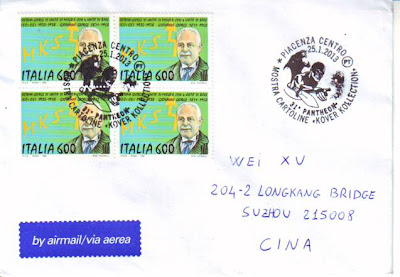ITALY COVER with stamp GIOVANNI GIORGI
Giovanni Giorgi (27 November 1871 - 19 August 1950) was an Italian electrical engineer who invented the Giorgi system of measurement, the precursor to the International System (SI).Giorgi was born in Lucca and studied engineering at the Institute of Technology of Rome, he worked at Fornaci Giorgi in Ferentino, then was the director of the Technology Office of Rome between 1906 and 1923. He also taught at the University of Rome between 1913 and 1939.
Toward the end of the 19th century, after James Clerk Maxwell's discoveries, it was clear that electric measurements could not be explained in terms of the three fundamental units of length, mass and time. Therefore, in 1901, Giorgi proposed to the AEI (Associazione Elettrotecnica Italiana) a new system that had as fundamental units the metre, the kilogram, the second and a fourth unit to be chosen from the units of electrotechnology.
In 1935 this was adopted by the IEC as the Giorgi system, also known as MKSΩ, because the fourth fundamental unit was that of electrical resistance, the ohm. In 1960, at the 11th General Conference of Weights and Measures, the SI (International System) was adopted, which was based on seven fundamental units: metre, kilogram, second, ampere, kelvin, mole and candela.
Giorgi died in Castiglioncello, Livorno at the age of 79.


没有评论:
发表评论